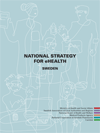 Information and communication technologies (ICT) offer numerous potential benefits in terms of improvements for patients, health and elderly care professionals and decision-makers. Citizens, patients and relatives must have quick, trouble-free access to quality-assured information on health care provision and health concerns, as well as personal data on their own care, treatment and health status. They must also be able to contact care services via the internet for assistance, advice or help with self-treatment. Health and elderly care professionals must have access to efficient, interoperable eHealth solutions that make it easier for them to perform their day-to-day work while guaranteeing patient safety. Authorities and other bodies responsible for care provision need ICT for effective follow-up of patient safety and quality concerns, and to support management functions and resource distribution.
Information and communication technologies (ICT) offer numerous potential benefits in terms of improvements for patients, health and elderly care professionals and decision-makers. Citizens, patients and relatives must have quick, trouble-free access to quality-assured information on health care provision and health concerns, as well as personal data on their own care, treatment and health status. They must also be able to contact care services via the internet for assistance, advice or help with self-treatment. Health and elderly care professionals must have access to efficient, interoperable eHealth solutions that make it easier for them to perform their day-to-day work while guaranteeing patient safety. Authorities and other bodies responsible for care provision need ICT for effective follow-up of patient safety and quality concerns, and to support management functions and resource distribution.
A range of issues relating to ICT use must be solved at national level, based on the collaboration of all actors in the health care sector. These concerns must be dealt with on the basis of a common approach and nationally established guidelines and solutions. A national eHealth strategy is needed to ensure efficient and effective use of ICT. Used as a strategic tool, ICT will promote safer, more accessible and efficient health and elderly care services.
Most of the work of enhancing the efficiency and effectiveness of ICT use will naturally devolve on the county councils, municipal councils and private care providers concerned. In addition, a range of measures will be required from government at various levels and from other actors in the health and elderly care sector. Increased use of eHealth must be combined with effective security measures designed to ensure that highly sensitive confidential information relating to individual patients or users is securely handled by all involved in care or service delivery.
Download National Strategy for eHealth - Sweden (.pdf, 783 KB)
Download from the eHealthNews.EU Portal's mirror: National Strategy for eHealth - Sweden (.pdf, 783 KB)
For further information, please visit:
http://www.sweden.gov.se/health